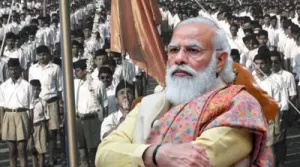Last week, Rashtriya Swayamsevak Sangh chief or Sarsanghchalak Mohan Bhagwat made a statement that is being called his clearest endorsement of caste-based reservations.
“We didn’t bother when their (people from oppressed castes) lives were like that of animals…people should be prepared to suffer for 200 years (as retribution),” Bhagwat said at Agrasen Chhatravas in Nagpur.
He said that the caste system has a history of 2000 years.
Why is this Important?
It goes against the RSS’ earlier positions in two respects.
Firstly on reservations, it seems to be an about-turn from the statement made by Bhagwat in 2015.
The Sarsanghchalak had said, “We believe, form a committee of people genuinely concerned for the interest of the whole nation and committed for social equality, including some representatives from society, they should decide which categories require reservation and for how long”.
He had argued that the policy of reservations based on social backwardness being extended now is not in line with what the makers of the Indian Constitution had in mind.
Though made in the context of the Patidar reservation stir that was going on in Gujarat then, Bhagwat’s remarks ended up harming the BJP in the 2015 Bihar elections. The party suffered a major defeat at the hands of the Mahagathbandhan, led by two leaders from background of social justice politics – Nitish Kumar and Lalu Prasad.
Then in 2017, RSS prachar pramukh (publicity chief) Manmohan Vaidya made a similar remark at the Jaipur Literature Festival: “BR Ambedkar has said reservations’ continuance in perpetuity is not good. There should be a time limit to it.”
The second change is regarding the caste system itself.
In 2014, BJP leader Bizay Sonkar Shastri published three books on three different Dalit communities. In the book, Suresh ‘Bhaiyaji’ Joshi, the then second-in-command of the RSS had said that caste exploitation began due to ‘Muslim invasions’.
“The invaders wanted to humiliate Chandravanshi Kshatriyas so they made them slaughter cows or work with the carcass of animals. This is what led to the formation of certain castes”.
RSS leader Suresh Soni writes in the same books that Dalits came about during the Mughal period.
By now saying that the caste system is 2000 years old, Bhagwat seems to be departing from the above views and admitting that caste inequalities have a much older origin.
What Explains This Change?
Though it is inevitable that the change in the RSS’ stand will be seen in the context of BJP’s electoral prospects, Sangh insiders say it doesn’t have anything to do with political calculations.
According to an RSS functionary in Karnataka, “There is an attempt to create a caste war by exploiting grievances. To prevent that war, we need to address these grievances”.
Referring to a recent statement by DMK leader and actor Udhayanidhi Stalin criticising Sanatan Dharma due to the caste system, the functionary that these are attempts to polarise and shouldn’t be taken lightly.
“Just because he made an extreme statement doesn’t mean that no one will believe it. If there are people who can fall for it, we should identify and reach out to them,” the functionary said.
There is a sense among sections of the RSS that Stalin’s statement wasn’t an isolated case or a faux pas and needs to be seen in the context of other statements like the ones made by Samajwadi Party leader Swami Prasad Maurya and the caste census demand by Opposition parties.
There is a belief in the Sangh camp that the Opposition is preparing the ground for ‘Mandal 2.0’.
There is also a practical acknowledgement that internal contradictions can’t all be papered over in the name of Hindu unity, they would need to be addressed.
“We cannot ignore aspirations of communities. We also can’t ignore that there may be genuine grievances. We need to find a way by which no one’s interests are compromised,” an RSS-aligned academic told The Quint.
What the RSS seems to be coming around to, is to accept reservations but tweak them in a way that prevents caste-based mobilisation.
A Balancing Act
In February this year, Mohan Bhagwat had stirred a controversy by saying that all people were created equal, irrespective of name, ability, and honour, but “the Pandits had created caste, and what the Pandits said on the basis of the shastras [scripture] was a lie”.
He made these comments at a Guru Ravidas Jayanti celebration in Mumbai.
This sparked some outrage against the RSS among Brahmin organisations who even put up posters against Bhagwat in some places.
Puri Shankaraacharya Nischalanand Saraswati also criticised Bhagwat’s comment and said that “RSS didn’t have any knowledge of their own”.
Forced to do damage control, the RSS said that Bhagwat had been misquoted and that he meant “intellectuals” not Brahmins when he said “Pandits”.
Though the RSS faced some criticism from such sections, it doesn’t really amount to a serious threat as these sections are still broadly supportive of the BJP and Hindutva, even if they may have some tactical differences with the RSS.
The bigger threat in the RSS’ view is if its ‘assimilation’ efforts towards oppressed castes are obstructed by advocates of social justice-based politics.
It is for this reason that Bhagwat is trying to bring at least some elements of social justice vocabulary into his public positions on caste. Of course, it remains to be seen whether this would lead to a larger change in RSS’ thinking on social justice or change in terms of greater representation of oppressed communities in the top positions in the organisation.
Mohan Bhagwat’s statement needs to be seen as an effort to assuage those who the RSS feels may get swayed towards social justice politics due to atrocities, cases of discrimination as well as the Opposition’s promises such as caste census.
(Courtesy: The Quint.)




